Smart Operations in Sports Management: Transforming Physical-Sports Culture in the Society 5.0 Era
DOI:
https://doi.org/10.47197/retos.v68.113607Palavras-chave:
Sports management, Society 5.0, Smart operations, Data analytics, Digital transformation, Sustainability in sportsResumo
Introduction: Society 5.0 emphasizes a human-centered approach leveraging AI, IoT, and big data for sustainability, inclusivity, and innovation. Sports management, traditionally reliant on manual methods and limited data, now adopts data-driven technologies to enhance decision-making, operational efficiency, and inclusivity in sports culture. Objectives: The study aims to,
- Investigate how data-driven technologies improve sports management efficiency.
- Identify trends transforming physical sports culture to foster inclusivity and societal well-being.Methodology: A mixed-methods approach was used, combining surveys, interviews, and statistical analyses (e.g., regression and ANOVA). Key performance indicators included operational efficiency, fan engagement, athlete performance, and inclusivity.
Results: Data analytics significantly improved sports management efficiency (R² = 1) by enhancing decision-making, fan engagement, and athlete performance. Targeted fan experiences increased satisfaction and inclusivity, while technology integration promoted sustainability.
Discussion: The findings highlight the transformative potential of data-driven strategies. Enhanced operational outcomes, personalized fan engagement, and improved athletic performance underline the growing role of AI and IoT in modern sports management.
Conclusion: Data analytics is reshaping sports management by boosting efficiency, inclusivity, and sustainability. Policymakers and industry stakeholders must prioritize data-driven technologies, capacity-building, and ethical standards to unlock the full potential of these advancements.
Referências
Aijun Liu, R. P. (2023). Hybrid design for sports data visualization using AI and big data analytics. Com-plex & Intelligent Systems, 9, 2969–2980. https://doi.org/https://doi.org/10.1007/s40747-021-00557-w
Aljawharah A. Alnaser, M. M. (2024). AI-Powered Digital Twins and Internet of Things for Smart Cities and Sustainable Building Environment. Applied Sciences MDPI, 14(24). https://doi.org/https://doi.org/10.3390/app142412056
Blond, A. (27 de Nov de 2024). Smart Fan Engagement in Sports: How AI is Reshaping the Spectator’s Experience. Requestum. https://requestum.com/blog/ai-for-fan-engagement-in-sports
Carla L Dellaserra, Y. G. (2014). Use of integrated technology in team sports: a review of opportunities, challenges, and future directions for athletes. J Strength Cond Res, 28(2). https://doi.org/10.1519/JSC.0b013e3182a952fb. PMID: 24263650
Ganiyu O. Adigun, Y. A. (2024). The Intelligent Libraries: Innovation for a Sustainable Knowledge Sys-tem in the Fifth (5th) Industrial Revolution. De Gruyter Saur, 74(3), 211-223. https://doi.org/https://doi.org/10.1515/libri-2023-0111
George Wilson, O. J. (2024). The Impact of Artificial Intelligence on Digital Marketing Strategies. Pre-prints . https://doi.org/https://doi.org/10.20944/preprints202408.0276.v1
JCU Open eBooks. (s.f.). 5.6 Triangulation of Data. JCU Open eBooks. https://jcu.pressbooks.pub/intro-res-methods-health/chapter/5-6-triangulation-of-data/
Kitsios, N.-A. P. (2023). Investigating the Influence of Artificial Intelligence on Business Value in the Digital Era of Strategy: A Literature Review. Information, 14(2). https://doi.org/https://doi.org/10.3390/info14020085
Vikas Khullar, V. S. (2024). Artificial Intelligence and Society 5.0. Chapman and Hall/CRC. https://doi.org/https://doi.org/10.1201/9781003397052
Yufei Qi, S. M. (2024). Digital technologies in sports: Opportunities, challenges, and strategies for safe-guarding athlete wellbeing and competitive integrity in the digital era. Technology in Society, 77. https://doi.org/https://doi.org/10.1016/j.techsoc.2024.102496
Zhiling Chen, X. D. (2024). Utilizing AI and IoT technologies for identifying risk factors in sports. Heli-yon, 10(10). https://doi.org/https://doi.org/10.1016/j.heliyon.2024.e32477
Zhongbo Bai, X. B. (2021). Sports Big Data: Management, Analysis, Applications, and Challenges. Com-plexity, 2021(1). https://doi.org/https://doi.org/10.1155/2021/6676297
Downloads
Publicado
Edição
Secção
Licença
Direitos de Autor (c) 2025 Tarun Kanade, Tushar Savale, Sampada Mashirkar, Harshada Parikshit Aurangabadkar, Jonathan Joseph

Este trabalho encontra-se publicado com a Licença Internacional Creative Commons Atribuição-NãoComercial-SemDerivações 4.0.
Autores que publicam nesta revista concordam com os seguintes termos:
- Autores mantém os direitos autorais e assegurar a revista o direito de ser a primeira publicação da obra como licenciado sob a Licença Creative Commons Attribution que permite que outros para compartilhar o trabalho com o crédito de autoria do trabalho e publicação inicial nesta revista.
- Os autores podem estabelecer acordos adicionais separados para a distribuição não-exclusiva da versão do trabalho publicado na revista (por exemplo, a um repositório institucional, ou publicá-lo em um livro), com reconhecimento de autoria e publicação inicial nesta revista.
- É permitido e os autores são incentivados a divulgar o seu trabalho por via electrónica (por exemplo, em repositórios institucionais ou no seu próprio site), antes e durante o processo de envio, pois pode gerar alterações produtivas, bem como a uma intimação mais Cedo e mais do trabalho publicado (Veja O Efeito do Acesso Livre) (em Inglês).
Esta revista é a "política de acesso aberto" de Boai (1), apoiando os direitos dos usuários de "ler, baixar, copiar, distribuir, imprimir, pesquisar, ou link para os textos completos dos artigos". (1) http://legacy.earlham.edu/~peters/fos/boaifaq.htm#openaccess


